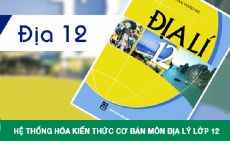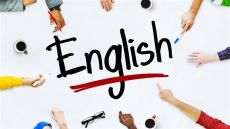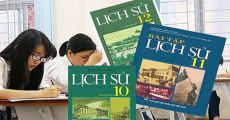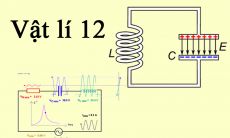Đề thi thử THPT QG năm 2021 môn Tiếng Anh
Trường THPT Lê Hồng Phong
-
Câu 1:
Indicate the word whose underlined part differs from the other three in pronunciation: accounts, champions, bottles, seasons
A. accounts
B. champions
C. bottles
D. seasons
-
Câu 2:
Indicate the word whose underlined part differs from the other three in pronunciation: compose, prove, post, program
A. compose
B. prove
C. post
D. program
-
Câu 3:
Indicate the word that differs from the other three in the position primary stress: social, culture, walking, attract
A. social
B. culture
C. walking
D. attract
-
Câu 4:
Indicate the word that differs from the other three in the position primary stress: secondary, national, admission, physical
A. secondary
B. national
C. admission
D. physical
-
Mark the letter A, B, C, or D on your answer sheet to indicate the correct answer to each of the following questions.
Câu 5:
She has read ______ interesting book.
A. a
B. an
C. the
D. x
-
Câu 6:
Your son and you have been to Europe, ______?
A. have you
B. do you
C. haven’t you
D. didn’t you
-
Câu 7:
If ______ measures are not taken immediately, there will be more teenagers smoking in the near future.
A. necessary
B. necessity
C. necessarily
D. unnecessarily
-
Câu 8:
Somebody threw paint ______ the man standing in the ground.
A. at
B. on
C. with
D. under
-
Câu 9:
We used to live in ______ families with support from others but our relationships have changed.
A. extended
B. expanded
C. excepted
D. excluded
-
Câu 10:
In most countries, photocopying books without the publisher’s permission is clearly a copyright ______.
A. interference
B. interpretation
C. infringement
D. infliction
-
Câu 11:
They are always ______ of what their children do.
A. support
B. supporting
C. supportive
D. supportively
-
Câu 12:
He has worked as a interpreter since he ______ from the university
A. graduated
B. graduates
C. will graduate
D. was graduating
-
Câu 13:
He found it unacceptable to send them all away ______ it was so late.
A. in spite of
B. because of
C. although
D. because
-
Câu 14:
Neil Armstrong was the first man ______ on the moon.
A. was walking
B. to walk
C. was walked
D. walked
-
Câu 15:
If our teacher were here now, he ______ us with this difficult exercise.
A. would help
B. will help
C. helps
D. has helped
-
Câu 16:
______, he has continued to work on his thesis.
A. Although all these problems
B. Even though there are problems
C. Despite of all these problems
D. In spite of there are problems
-
Câu 17:
I will never forget ______ the first prize in an English-speaking contest held by my faculty.
A. to award
B. to be awarded
C. awarding
D. being awarded
-
Câu 18:
Many organizations have been ______ drawing up the report on environmental campaigns.
A. involved in
B. confined in
C. enquired about
D. concerned about
-
Câu 19:
They reached the border with the police ______ on their heels.
A. near
B. cold
C. far
D. hot
-
Mark the letter A, B, C, or D on your answer sheet to indicate the word(s) CLOSEST in meaning to the underlined word(s) in each of the following questions.
Câu 20:
Around 150 B.C. the Greek astronomer Hipparchus developed a system to classify stars according to brightness.
A. record
B. shine
C. categorize
D. diversify
-
Câu 21:
Before the advent of the railways, communications were slow and difficult.
A. import
B. disappearance
C. introduction
D. arrival
-
Mark the letter A, B, C, or D on your answer sheet to indicate the word(s) OPPOSITE in meaning to the underlined word(s) in each of the following questions.
Câu 22:
Unless the two signatures are identical, the bank won’t honour the check.
A. genuine
B. different
C. fake
D. similar
-
Câu 23:
She’s a bit down in the dumps because she’s got to take her exam again.
A. sad
B. embarrassed
C. confident
D. happy
-
Mark the letter A, B, C, or D on your answer sheet to indicate the option that best completes each of the following exchanges.
Câu 24:
- A: “Would you like me to send this package for you?” - B: “______”
A. That would be nice. Any problems?
B. Yes, please, if you don’t mind
C. I’m sorry, but here you are
D. No, thanks. I’m really busy
-
Câu 25:
- Roger: “Wow! You look terrific in that new dress!” - Tina: “______”
A. Oh, what a pity!
B. I’m afraid so!
C. Thank you. I’m glad you think so.
D. Why dare you say so?
-
Read the following passage and mark the letter A, B, C, or D on your answer sheet to indicate the correct word or phrase that best fits each of the numbered blanks from 26 to 30
Vietnam has made major strides in caring for, educating and protecting children over the past 27 years (26) ______ the country became the first in Asia and second in the world to ratify the implementation of the United Nations Convention on the Rights of the Child (UNCRC) in 1990.
The education and protection of children are (27) ______ a key political mission of Party Committees from central to local levels and a top priority in the country’s socio-economic development strategies. Article 37 of the 2013 Constitution stipulates that “Children shall be protected, cared for and educated by the State, family and society; and participated in child-related issues. Harassing, persecuting, maltreating, abandoning or abusing children, exploiting child labour or (28) ______ acts that violate children’s rights are prohibited.”
Additionally, the 13th National Assembly adopted the Child Law in April 2016, (29) ______ came into force in June 2017, with the revision and supplementation of some articles to concretise the Constitution and the convention. The National Action Programme for Children also emphasised that children need to be (30) ______ special citizens and cared for by the State and people and should enjoy a healthy environment for physical, intellectual and moral development.
Câu 26:
(26)......................
A. since
B. however
C. although
D. therefore
-
Câu 27:
(27)......................
A. played
B. regarded
C. considered
D. taken
-
Câu 28:
(28)....................
A. one
B. other
C. every
D. another
-
Câu 29:
(29)......................
A. that
B. why
C. when
D. which
-
Câu 30:
(30).....................
A. agreed
B. decided
C. treated
D. performed
-
Read the following passage and mark the letter A, B, C, or D on your answer sheet to indicate the correct answer to each of the questions from 31 to 35.
Visitors to London are struck by the proud splendour and glamour of one of the world’s oldest capitals, admiring iconic sites like Big Ben, the Palace of Westminster and Buckingham Palace. However, visitors seeking a glimpse into the city’s everyday life should not miss Portobello Market, which is the most-visited market in London.
This vibrant market has been featured in a number of films, documentaries and bestselling books, the most famous being the film “Notting Hill” starring Hugh Grant and Julia Roberts, which brought Portobello Market to the attention of audiences all over the world.
Portobello Market is divided into different sections selling second-hand items, clothing, jewellery, souvenirs and vegetables. The most sought-after area is devoted to antiques. Visitors may feel overwhelmed as there are over 1,000 booths manned by antique dealers from throughout England. It’s a great fun to browse through antique cameras, watches, pottery and paintings that date back 300 years. They are sold at different prices, so it’s possible to find a few good bargains. It seems that both buyers and sellers look forward to the weekends when they can meet and escape the city’s fast pace at Portobello Market.
When tired from exploring the market, visitors can drop into the nearby food courts to savour an Indian curry, Italian pizza or sandwiches from Europe. It’s a great pleasure to drink a cappuccino while listening to street performers. These represent the lively fun of Portobello Market, offering exciting experiences that keep people coming back.
Câu 31:
What is the main idea of the passage?
A. The film “Notting Hill"
B. The city of London
C. Portobello Market
D. European cuisine
-
Câu 32:
According to the passage, Portobello Market has been featured in all of the following EXCEPT ______.
A. films
B. documentaries
C. books
D. songs
-
Câu 33:
Which of the following is TRUE about the reason why visitors to the antique area may feel overwhelmed?
A. They can meet all sorts of people from England
B. All the antiques are sold at the same price
C. There are a large number of antique shops there
D. All the antiques are more than 300 years old
-
Câu 34:
The word “they” in paragraph 3 refers to ______.
A. prices
B. buyers and sellers
C. bargains
D. weekends
-
Câu 35:
The word “savour” in paragraph 4 mostly means ______.
A. enjoy
B. prepare
C. see
D. make
-
Read the following passage and mark the letter A, B, C, or D on your answer sheet to indicate the correct answer to each of the questions from 36 to 42.
The history of clinical nutrition, or the study of the relationship between health and how the body takes in and utilizes food substances, can be divided into four distinct eras: the first began in the nineteenth century and extended into the early twentieth century when it was recognized for the first time that food contained constituents that were essential for human function and that different foods provided different amounts of these essential agents. Near the end of this era, research studies demonstrated that rapid weight loss was associated with nitrogen imbalance and could only be rectified by providing adequate dietary protein associated with certain foods.
The second era was initiated in the early decades of the twentieth century and might be called “the vitamin period”. Vitamins came to be recognized in foods, and deficiency syndromes were described. As vitamins became recognized as essential food constituents necessary for health, it became tempting to suggest that every disease and condition for which there had been no previous effective treatment might be responsive to vitamin therapy. At that point in time, medical schools started to become more interested in having their curricula integrate nutritional concepts into the basic sciences. Much of the focus of this education was on the recognition of deficiency symptoms. Herein lay the beginning of what ultimately turned from ignorance to denial of the value of nutritional therapies in medicine. Reckless claims were made for effects of vitamins that went far beyond what could actually be achieved from the use of them.
In the third era of nutritional history in the early 1950’s to mid-1960’s, vitamin therapy began to fall into disrepute. Concomitant with this, nutrition education in medical schools also became less popular. It was just a decade before this that many drug companies had found their vitamin sales skyrocketing and were quick to supply practicing physicians with generous samples of vitamins and literature extolling the virtue of supplementation for a variety of health-related conditions. Expectations as to the success of vitamins in disease control were exaggerated. As is known in retrospect, vitamin and mineral therapies are much less effective when applied to health-crisis conditions than when applied to long-term problems of under nutrition that lead to chronic health problems.
Câu 36:
What is the main idea of the passage?
A. The stages of development of clinical nutrition as a field of study
B. The effects of vitamins on the human body
C. Nutritional practices of the nineteenth century
D. The history of food preferences from 19th century to the present
-
Câu 37:
Accorsing to paragraph 1, which of the following discoveries was made during the first era in the history of nutrition?
A. Effective techniques of weight loss were determined.
B. Vitamins were synthesized from foods.
C. Certain foods were found to be harmful to good health.
D. Protein was recognized as an essential component of diet.
-
Câu 38:
The word “rectified” in paragraph 1 is closest in meaning to ______.
A. celebrated
B. anticipated
C. corrected
D. described
-
Câu 39:
The word “tempting” in paragraph 2 is closest in meaning to ______.
A. realistic
B. attractive
C. correct
D. necessary
-
Câu 40:
According to the passage, why do schools begin to teach concepts of nutrition?
A. to encourage medical doctors to apply concepts of nutrition in the treatment of disease
B. to convince medical doctors to participate in research studies on nutrition
C. to convince doctors to conduct experimental vitamin therapies on their patients
D. to support the creation of artificial vitamins
-
Câu 41:
The word “them” in paragraph 2 refers to ______.
A. therapies
B. vitamins
C. effects
D. claims
-
Câu 42:
Which statement is TRUE, according to the passage?
A. The public lost interest in vitamins.
B. Nutritional research was of poor quality.
C. Claims for the effectiveness of vitamin therapy were exaggerated.
D. Medical schools stopped teaching nutritional concepts.
-
Mark the letter A, B, C, or D on your answer sheet to indicate the underlined part that needs correction in each of the following questions.
Câu 43:
My close friends spends most of their free time helping the homeless people in the community.
A. close friends
B. spends
C. most of
D. helping
-
Câu 44:
They are looking forward to going abroad, making new friends, and learn a new language.
A. forward
B. making
C. learn
D. language
-
Câu 45:
A public spending programme is out of the question in the current economical climate.
A. spending
B. out of
C. the question
D. economical
-
Mark the letter A, B, C, or D on your answer sheet to indicate the sentence that is closest in meaning to each of the following questions.
Câu 46:
Needless to say, Mike is cleverer than other students in the class.
A. Needless to say, Mike is not so clever as other students in the class.
B. Needless to say, other students in the class are clever than Mike.
C. Needless to say, other students in the class is as clever as Mike.
D. Needless to say, Mike is the cleverest student in the class.
-
Câu 47:
“I have phoned him three times today,” Mark said.
A. Mark said that I had phoned him three times today.
B. Mark said that he had phoned him three times that day.
C. Mark said that he would phone him three times today.
D. Mark said that I have phoned him three times that day.
-
Câu 48:
Her daughter is able to play the piano very well.
A. Her daughter can play the piano very well.
B. Her daughter needn’t play the piano very well.
C. Her daughter must play the piano very well.
D. Her daughter couldn’t play the piano very well.
-
Mark the letter A, B, C, or D on your answer sheet to indicate the sentence that best combines each pair of sentences in the following questions.
Câu 49:
You can play computer games. Make sure you stop at 1 p.m.
A. You can play computer games in case you don’t stop at 1 p.m.
B. You can play computer games provided you fail to stop at 1 p.m.
C. You can’t play computer games unless you promise to stop at 1 p.m.
D. You can’t play computer games if you promise to stop at 1 p.m.
-
Câu 50:
He is very intelligent. He can solve all the problems in no time.
A. So intelligent a student is he that he can solve all the problems in no time.
B. An intelligent student is he that he can solve all the problems in no time.
C. So intelligent is he that he can solve all the problems in no time.
D. He is very intelligent that he can solve all the problems in no time.














